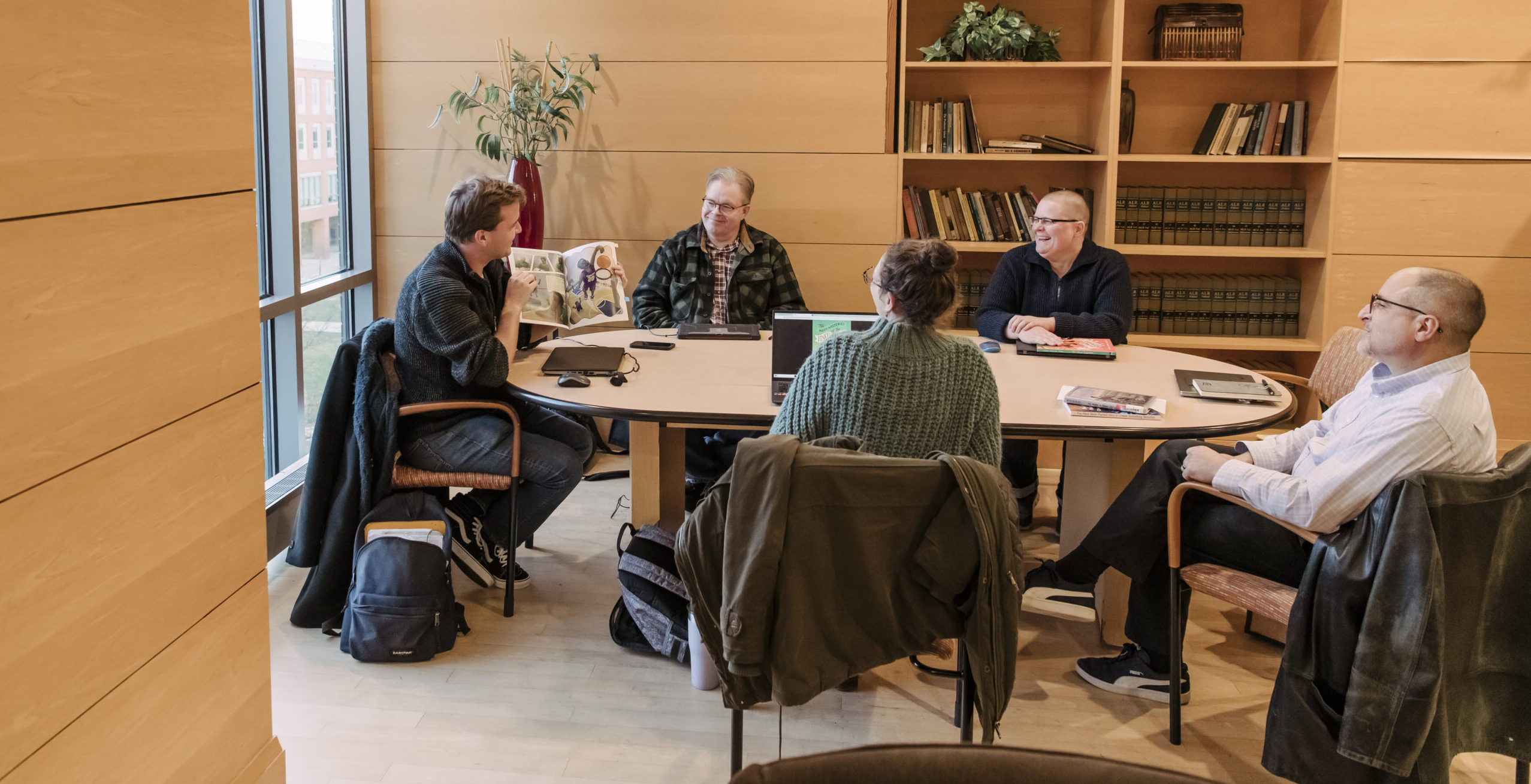Neurodiversity inclusion and representation have been at the forefront of Michael Canale’s 20-year career in the disability services and education field. Canale, M.A. ’24, intercultural communication, is the assistant director of UMBC’s Office of Student Disability Services and teaches the first-year seminar Introduction to Disability Studies. “Sometimes parents of neurodivergent students worry that their child is incapable of learning another language,” says Canale. “I work with parents to ease their fears by showing them how their child can excel in college with the proper individualized accommodations.” These can include note-taking software, counseling services, tutoring, time management support, and more.
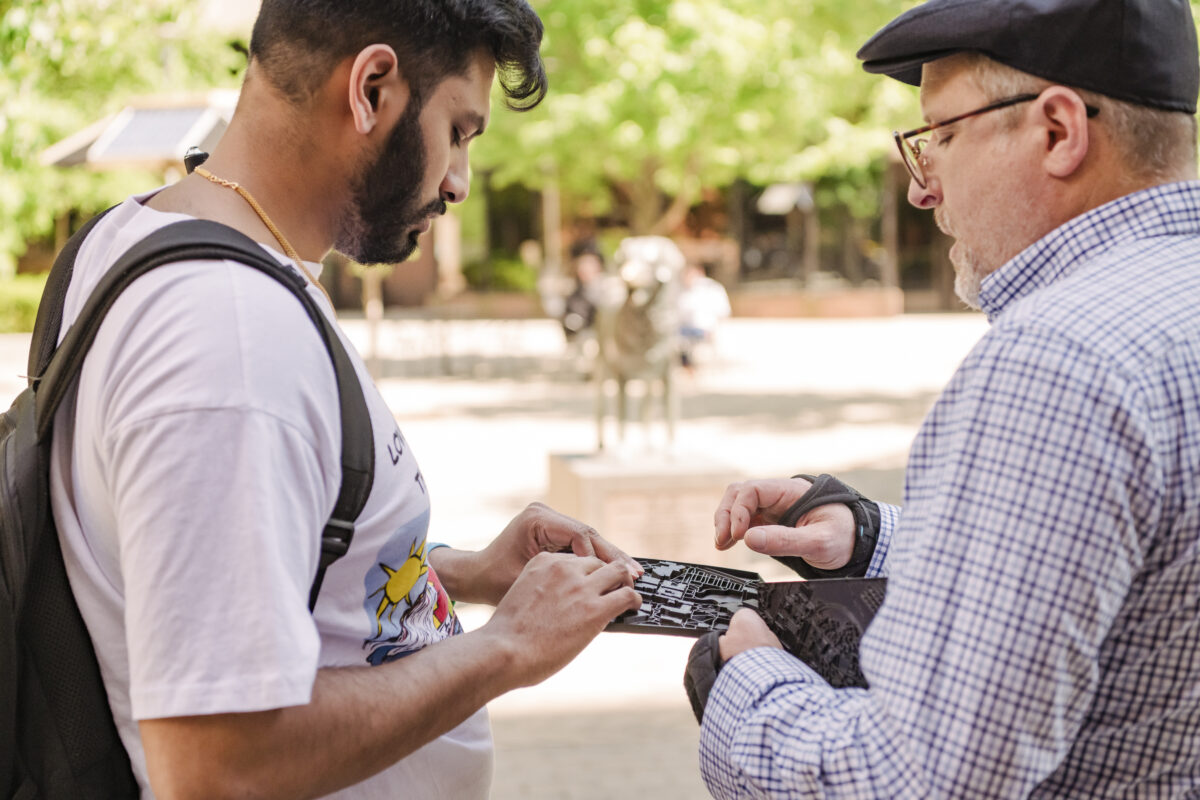
When Canele, who also received his post-master’s certificate in college teaching and learning science, heard that UMBC’s first Fulbright Scholar-in-Residence, Jules Buendgens-Kosten, would be teaching Language Learning and Special Education – Advanced Special Topics in Education, he was quick to enroll. The course, part of UMBC’s teaching English to speakers of other languages (TESOL) master’s program, was designed for anybody planning to work with heterogeneous groups of learners, including those of different neurotypes, both in special education and mainstream education settings.
Buendgens-Kosten, a research assistant at the Institute of English and American Studies at Goethe-Universität Frankfurt, Germany, began their partnership with UMBC as a research collaboration with Shannon Sauro, associate professor of education. Sauro recognized that Buendgens-Kosten’s expertise in English language teaching and teaching neurodivergent populations in Germany would add an international and non-U.S.-based perspective to UMBC’s TESOL program and education department.
“If students have not experienced an inclusive classroom, they may be afraid of managing an inclusive classroom when they become teachers,” says Buendgens-Kosten, whose research helps prepare educators to teach students with dyslexia, ADHD, autism spectrum disorder, and other minority neurotypes. “One way to reduce this fear is giving teachers tools for best practices.”
Own-voice texts
To help students learn about neurodivergent experiences, Buendgens-Kosten had students choose an “own-voice” children’s book that included characters with dyslexia, ADHD, autism spectrum disorder, and other minority neurotypes. Own-voice texts are books written by underrepresented authors, in this case, neurodivergent authors writing about neurodivergent communities. The stories veer away from narratives based on neurotypical authors’ understanding of neurodivergent people and those who champion overcoming neurodiversity to embrace a more neurotypical lifestyle.
Valeri Vanier, an international TESOL student from Dijon, France, chose Nelson Beats the Odds by Ronnie Nelson Sidney II. Vanier explained Nelson’s experience as a student who has ADHD and a learning disability. “The book is very colorful and a fun story. It’s about having positive self-esteem and reflects the author’s experience with learning disabilities,” Vanier said. “But, I’m critical of it because I feel that Nelson’s success is defined by achieving academic success in a neurotypical way.”
Buendgens-Kosten agreed with Vanier, noting the info boxes about well-known neurodivergent people in the book might inadvertently send a message that it is okay to be neurodivergent as long as you grow up to be rich and famous.
Vanier began his teaching career shortly after COVID-19 forced him to close his historical guided tours company. He saw the need to support remedial learners and launched Le Goût d’Apprendre/ A Taste for Learning, which partners with parents, schools, and organizations to develop individualized learning programs. After in-person teaching came back in full swing, Vanier wanted to broaden his teaching skills and subject area to include a TESOL credential. He found a home in UMBC’s TESOL program. His advisor suggested this seminar because of his prior teaching experience.
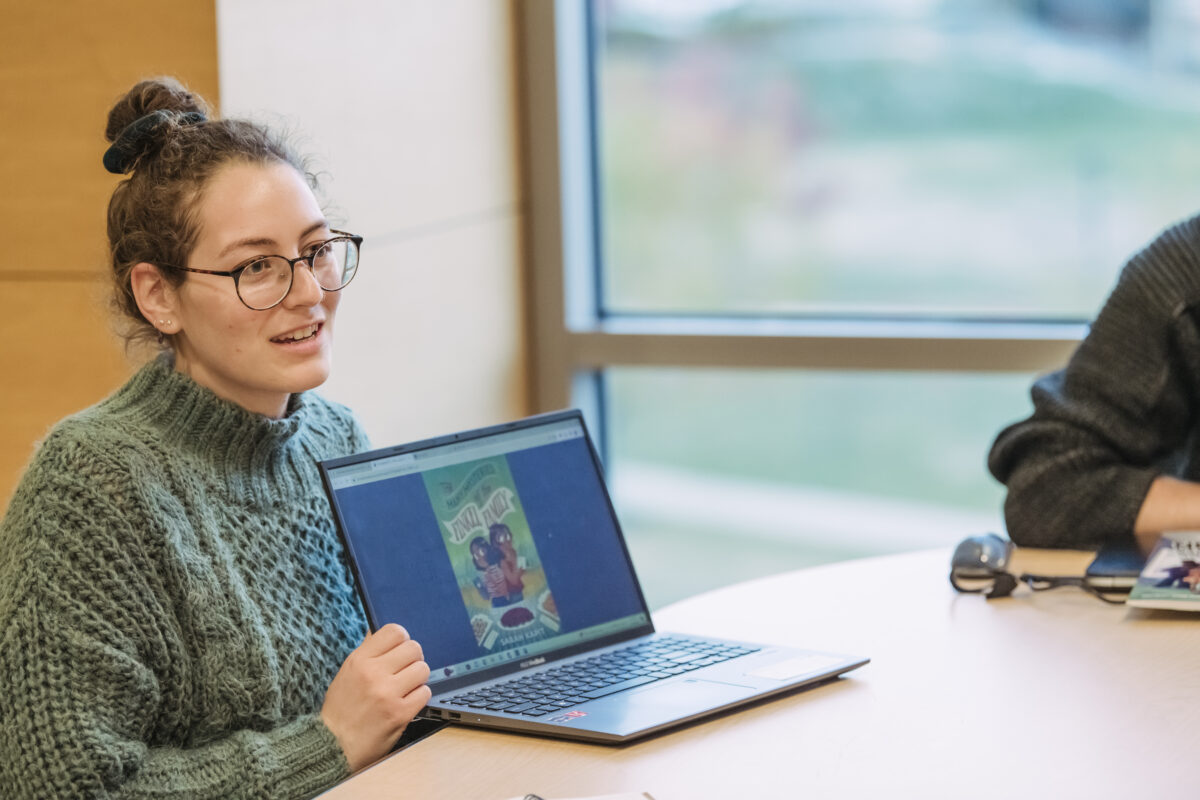
Fellow TESOL masters student, Maia Scarabelli, a 2022 Shriver Peaceworker Fellow, is preparing to become an early education teacher of English language learners. Scarabelli also came to UMBC with teaching experience. Before UMBC, she taught English as a Peace Corps Volunteer in Honduras and Myanmar. For Buendgens-Kosten’s class, Scarabelli analyzed Daniela Schreiter’s graphic novel The World Beyond My Shadow about her life growing up with Asperger’s syndrome. “The visuals make the story more accessible for English language learners,” says Scarabelli. “The oscillation between her life as a child and as an adult looking in from another planet—in the context of English language teaching in the U.S., feeling like an outsider from another country—resonates with the experience of many English language learners.”
Addressing English language acquisition with neurodiversity in the classroom is one of the reasons Scarabelli wanted to work with Buendgens-Kosten. Scarabelli says, “It’s not common to find a special education specialist who is also an English language acquisition specialist. We tend to keep those specializations separate. This is a refreshing and unique experience.”
Inclusion practices create pathways for neurodivergent students to learn in a heterogenous classroom and for neurotypical students to work alongside neurodivergent peers. This is key for students preparing to be teachers. It reduces the stigma of neurodivergent students.
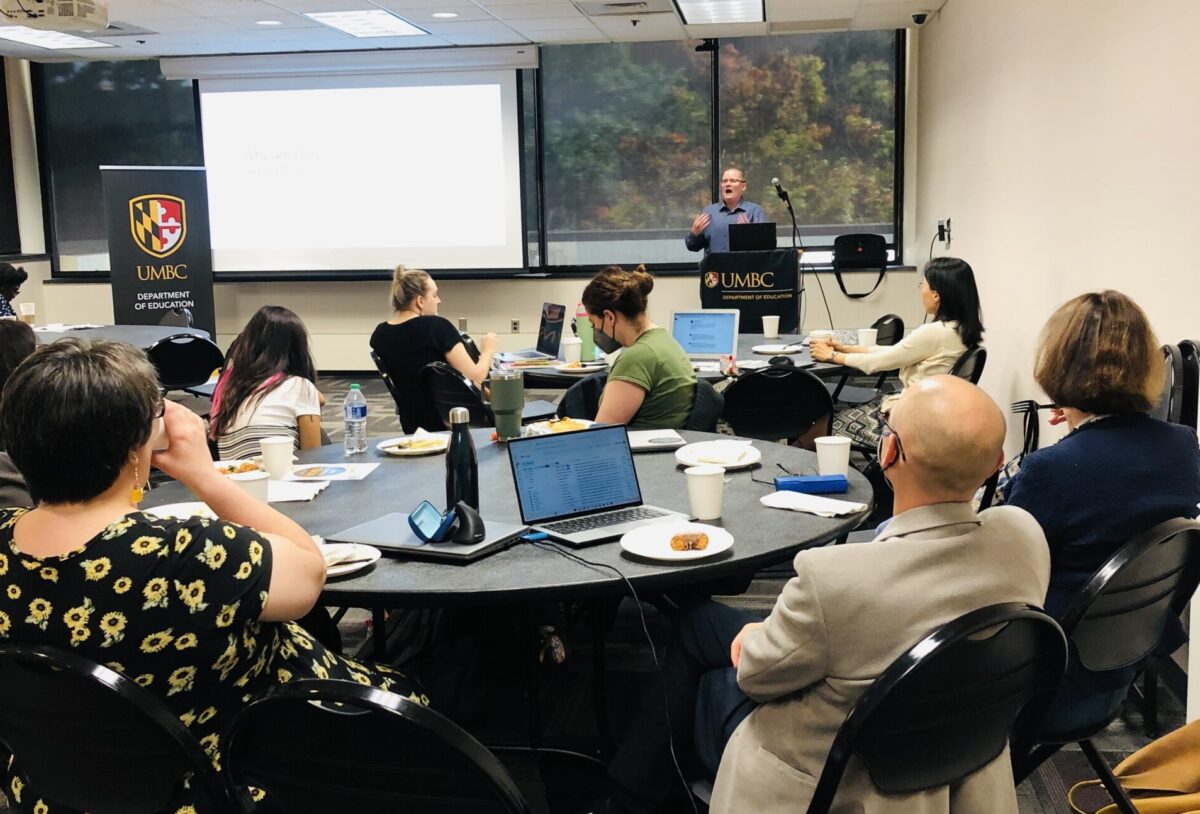
“If you have people of different neurotypes in your language classroom, you should reflect their interests, their lived experience, communicative habits, communicative needs, and communicative interests,” Buendgens-Kosten explained to UMBC faculty at their Fulbright Scholar-in-Residence research lecture. “Sharing the experiences and needs of only the neurotypical majority cannot be the only measure of how and what we’re teaching. This also means that they deserve to see models of successful language users of their neurotype.”
Life-changing inclusion
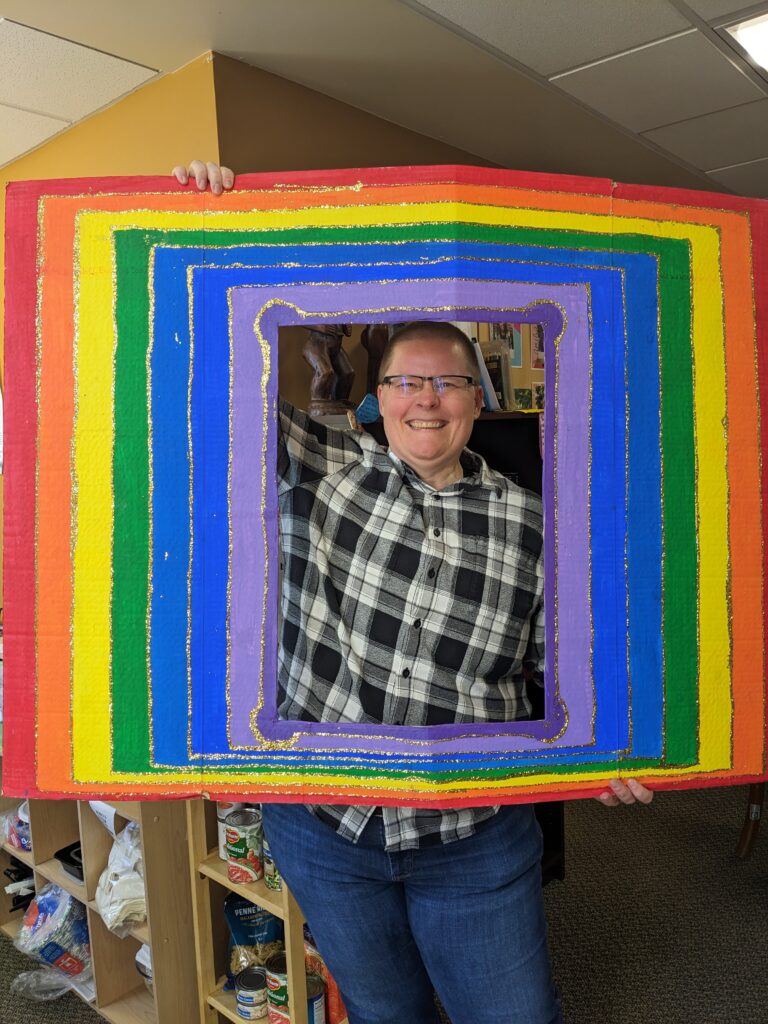
While Buendgens-Koston was at UMBC, not only did they share their expertise, but they also learned about new technical tools to improve the learning process at the college level, such as UMBC’s Blackboard Ally, which improves content accessibility and usability. “The Ally accessibility feature really impressed me,” said Buendgens-Kosten, now back in Germany where they shared the tool with their IT team. “I liked that people could add a recording of their name to their official profiles—this is very helpful when you have a name like mine.”
Buendgens-Kosten also enjoyed the inclusivity of campus events. “When you log into myUMBC, there are events across all disciplines, for students, for staff, etc.,” said Buendgens-Kosten. “At my university, I know what is offered by my institute, or maybe even my faculty, but I see much less of what is going on in other parts of the university.” They also were surprised that UMBC celebrated National Coming Out Day and commemorated Trans Day of Remembrance, something they say is missing at Goethe University.
“My Fulbright experience at UMBC deeply impacted how I view the university as a community and place of learning,” says Buendgens-Kosten. “I experienced different ways of teaching and interacting with students. Such small-seeming things can make a surprisingly big impact.
Sauro says UMBC’s first Fulbright Scholar-in-Residence has inspired other faculty to apply to welcome another Scholar-in-Residence. “I think this is a wonderful opportunity for internationalizing at home and fostering the exchange of ideas with scholars from different parts of the world,” says Sauro.
UMBC’s future in neurodiversity research
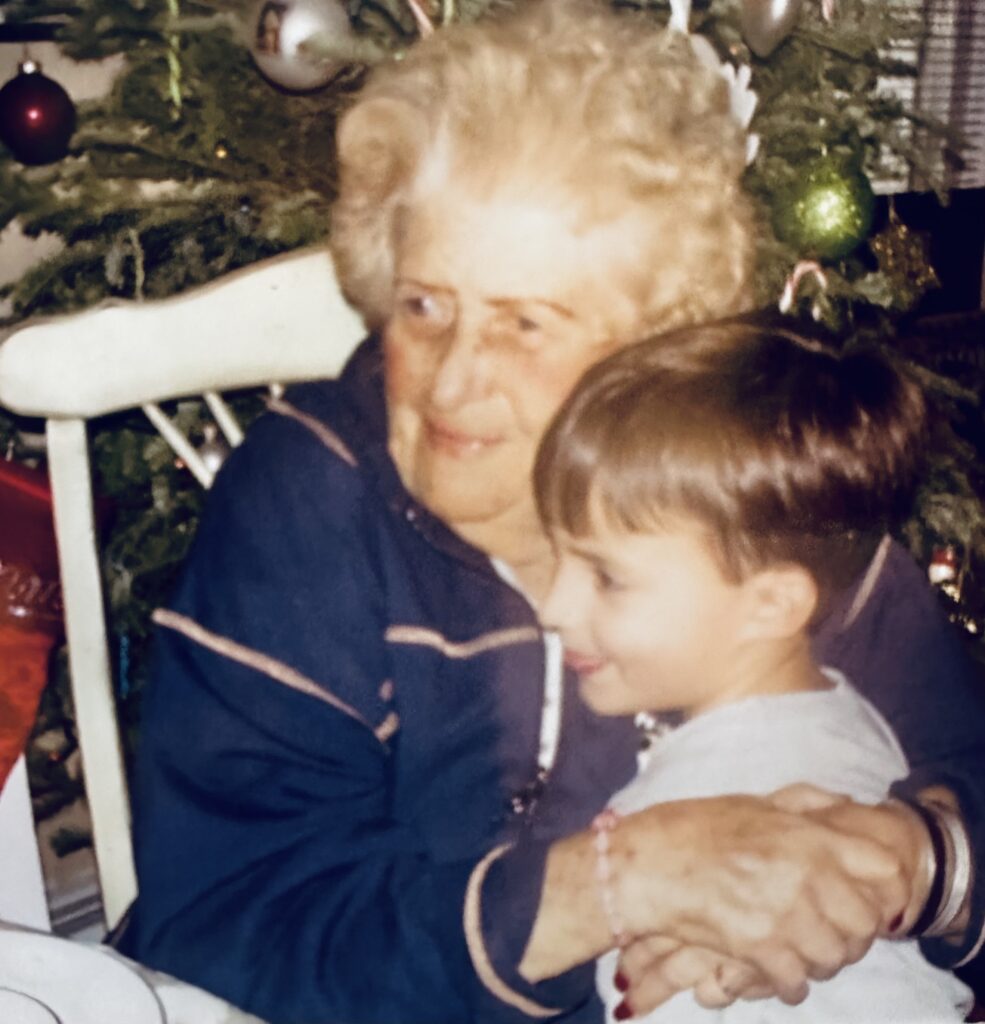
For Canale, learning from Buendgens-Kosten was yet another confirmation of how life-changing inclusion can be. He wishes inclusive teaching had been offered when his Deaf grandmother was growing up. Lillian Michalina Canale depended on her grandson and the rest of her family to navigate life in a hearing world. “When I enrolled in a sign language interpreter undergraduate program, my grandmother was amazed that there was formal education for sign language,” says Canale. “It was then that I realized I had been interpreting since I was nine, but had no clue. I was just telling others what Grandma said, and I’m telling Grandma what they said.” It was the foundation for his career.
The end of Buendgens-Kosten’s visit was bittersweet for Canale. “There isn’t anyone like them at UMBC right now,” says Canale. He’s grateful to have grown the disabilities services program over the last 10 years that he’s been here. However, he knows the possibilities are exponential. “It may begin with having a conversation about accommodations but UMBC has the potential to lead in accessibility and inclusion research in every field of study because neurodivergent students, professionals, clients, and consumers encompass all parts of life.”
The Institute of International Education, which manages the Fulbright Scholar-in-Resdience program, has selected UMBC’s Center for Global Engagement (CGE) to facilitate the pre-departure orientation for all Scholars-in-Residence globally working at universities across the United States. This June, 43 scholars will participate in a three-day virtual orientation. CGE staff will lead sessions on various topics including campus and community engagement and networking led by Madison Pickard M.A. ’24, intercultural communication, a 2022 Shriver Peace Worker, and a graduate assistant and special programs coordinator. Classroom management led by Ryan Sheldon, director of the English Language Institute and Special Programs. Diversity and inclusion on a U.S. campus led by Viridiana Colosio-Martinez ’22, modern languages, linguistics, and intercultural communication, and M.A. ’24, intercultural communication. Intercultural communication led by Brian Souders, M.A.’19, TESOL and Ph.D. ’09, language, literacy and culture, the associate director of global learning. The U.S. higher education system led by David Di Maria, associate vice provost for international education.
Learn more about UMBC’s TESOL program and the Center for Global Engagement.
Tags: CAHSS, CAHSS_research, COEIT, Education, Fulbright, MLLI, peaceworker, PoliticalScience, Research, TESOL

